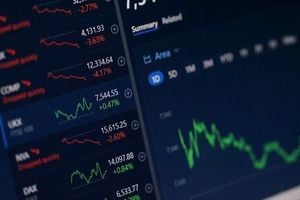DeepSeek, the new AI chatbot launched by a Chinese startup, is causing quite the stir with its rapid rise and competitive edge against the established leader ChatGPT by OpenAI. Since its launch at the start of January 2025, DeepSeek’s growth has been unprecedented, shaking up the tech market and raising eyebrows among investors and developers alike.
DeepSeek’s R1 model claims to match or even exceed the capabilities of ChatGPT, particularly excelling at reasoning tasks, but it does so at merely a fraction of the expected development costs. Philippe Notton, CEO of the European semiconductor firm SiPearl, stated, "DeepSeek claims to have developed its model with just €6.23 million, far below its Western competitors." This remarkable financial efficiency has questioned the high-cost development model typically seen within American tech firms.
To put things in perspective, Stephen Walker, the founder of Klu.ai, estimated it might take around €920 million to train ChatGPT with the necessary Nvidia chips compared to the modest investment DeepSeek claims to have utilized. Notton elaborated, "If what DeepSeek said is true, they can develop such a model for only €5.75 million with some 2,000 to 4,000 GPUs," adding the ecological benefits of lower energy consumption.
The initial impact on the market has been stark. Following the announcement of DeepSeek’s capabilities, shares of Nvidia—the leading supplier of AI chips—plummeted about 17% on one day alone, marking one of the largest single-day market cap losses on Wall Street. This led to fears among investors about diminishing demand for high-end AI hardware should DeepSeek's model gain traction.
By January 28, statistics showed DeepSeek’s AI assistant app had soared to the top of both Apple’s App Store and Alphabet Inc.’s Android Play Store. Sensor Tower reported the app had accumulated 16 million downloads within its first 18 days, far surpassing ChatGPT's initial 9 million downloads.
Despite this impressive start, concerns linger surrounding DeepSeek's rise, particularly related to data security and cybersecurity measures. Reports reveal certain firms and government contractors have blocked access to DeepsSeek apps out of caution, citing fears about potential data breaches and the company’s Chinese origins.
Nevertheless, on the international front, industry observers speculate whether DeepSeek can sustain its rapid growth. While it may currently trail ChatGPT significantly—117.5 million visits to ChatGPT’s site compared to DeepSeek’s 6.2 million on January 24—there's potential for Head-to-head competition as user preferences shift.
OpenAI is not resting on its laurels either. With pressure mounting from DeepSeek, ChatGPT's developers may need to expedite their innovation cycles. The market now faces a pivotal point where traditional methods of AI development could change. OpenAI is rumored to be considering new pricing strategies and exploring plans to convert more of its free users to paid subscribers, especially after witnessing DeepSeek's success.
DeepSeek's potential to democratize AI technology with its open-source model has raised discussions among developers worldwide. This strategy allows developers to build upon and customize the AI technology without incurring high costs, potentially transforming the AI development paradigm from capital-intensive to innovation-centric.
Nonetheless, the future remains clouded by geopolitical undercurrents. Notton and others have pointed out the likely shift of tech dominance as numerous countries begin to invest resources toward building their own competitive AI solutions. This could diminish Western dependency on tech giants like OpenAI, fostering innovation globally.
For everyday users, the arrival of DeepSeek may signal more affordable and accessible AI tools. It could spur innovation within local businesses and educational initiatives, enhancing how people interact with AI daily. Still, the complications surrounding data privacy and security, especially the issues related to using models developed from non-Western origins, cannot be ignored.
DeepSeek’s entry has undeniably altered the AI chatbot playing field, challenging the heavily funded titans of the technology sector. While the rise of DeepSeek brings hope for cost-effective AI solutions, the repercussions of cybersecurity risks and regulatory challenges hang heavy on the horizon. The coming months will likely witness how both DeepSeek and ChatGPT evolve, potentially setting new benchmarks for AI development moving forward.



